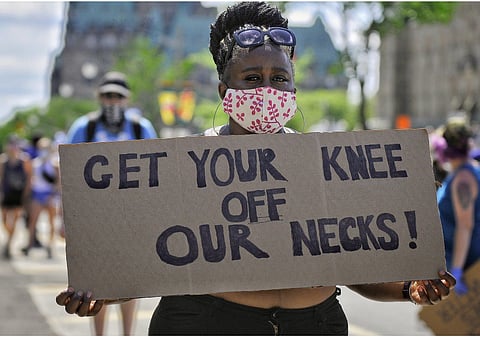OPINION: The Chauvin Verdict is Simply Justice. Why Are We Celebrating It?
by Marcus Harrison Green
(This article previously appeared in The Seattle Times and is reprinted under an agreement.)
Derek Chauvin was finally held accountable Tuesday for the murder of George Floyd, but joy skipped over me.
Despite the explosion of honking horns near my workspace following Judge Peter Cahill's reading of guilty on all counts, relief was the only thing that came over me.
It was the reprieve that comes when a knee crushing down on your neck is finally removed, allowing you to gasp air that should never have been so hard to inhale in the first place.
I am of course happy for George Floyd's family and five children, including his 6-year-old, Gianna. Chauvin forced them to bury their father when he had so much life left to live.
And I don't wish to dampen the excitement of longtime activists, or those who newly discovered activism after Floyd's murder, who have kept police reform and transformation at the forefront of society's mind.
But all I can do is exhale for this singular moment, knowing all it took to arrive at a destination that should never have been in dispute — but was, for nearly a year.
Would we have justice today if not for a grotesque nine-and-a-half minutes of video showing a remorseless Chauvin killing Floyd? Would we be here if not for nonstop mass protests, a pandemic that acted as an accelerant of those protests, an overdue national audit of our country's racist legacy, and our president stating the evidence against Chauvin was overwhelming?
All that just to arrive here, at justice.
It has been a destination so elusive in cases of police killings of Black people. Many I spoke with in the Black community, guided by history, believed it would evade yet another person, as it had Breonna Taylor, Charleena Lyles and Manuel Ellis.
I shared their sentiment.
America's justice system is a story of justice being anticipated by white people yet only wished for by those who are Black and Brown.
But as my friend Dr. Daudi Abe, who has worked on anti-racist training for police officers, texted me, "With the defeat of Trump and then this verdict America has now surprised me twice in a row."
Forgive me if neither of us is holding our breath for a third revelation.
Many are calling Chauvin's conviction a watershed moment, not only because of the verdict in a country where 99% of police killings end up without criminal charges against an officer, but also the succession of Chauvin's fellow officers who testified against him. Each one of them piercing the "thin blue line."
I have trouble joining that chorus.
With the evidence being so unambiguously clear, I tend to see this as a sacrificial lamb being led to slaughter in order to save a current system that has killed three people every day, largely people of color, during the Chauvin trial.
The "one bad apple" narrative already emerging provides a convenient scapegoat for the more than 18,000 police agencies in this country.
For the record, no, I do not think every officer is a horrendous human being, but quite frankly I do not think it matters whether they are good or not. What does matter is that they be held accountable for every action that ends with the loss of another human's life, and every trauma they provoke — as we all should be.
Policing is a tough job, yes. It is also one entered into voluntarily. A job whose allowance of an extraordinary use of force should be linked with an extraordinary obligation to the public — the entire public — it claims to serve.
That is an obligation that failed Manuel Ellis, failed 13-year-old Adam Toledo, and failed Daunte Wright.
And there is nothing about the Chauvin trial that made me believe it will not fail more families in the future.
So I apologize, but I cannot celebrate this verdict today, any more than I can celebrate an invitation to a house that I live in. Because I should expect to be welcomed in my home, as much as Black and brown and Asian/Pacific Islander Americans should expect justice, fairness and equity, every single day in this country, without any doubt.
Let me know when that day comes.
Joy will find me then.
Marcus Harrison Green is the publisher of the South Seattle Emerald. Growing up in South Seattle, he experienced firsthand the impact of one-dimensional stories on marginalized communities, which taught him the value of authentic narratives. After an unfulfilling stint in the investment world during his twenties, Marcus returned to his community with a newfound purpose of telling stories with nuance, complexity, and multidimensionality with the hope of advancing social change. This led him to become a writer and found the Emerald. He was named one of Seattle's most influential people by Seattle Magazine in 2016 and was awarded 2020 Individual Human Rights Leader by the Seattle Human Rights Commission.
The featured image is attributed to Bluescruiser1949 under a Creative Commons 2.0 license (CC BY-NC 2.0).
Before you move on to the next story …
The South Seattle Emerald™ is brought to you by Rainmakers. Rainmakers give recurring gifts at any amount. With around 1,000 Rainmakers, the Emerald™ is truly community-driven local media. Help us keep BIPOC-led media free and accessible.
If just half of our readers signed up to give $6 a month, we wouldn't have to fundraise for the rest of the year. Small amounts make a difference.
We cannot do this work without you. Become a Rainmaker today!
Help keep BIPOC-led, community-powered journalism free — become a Rainmaker today.


